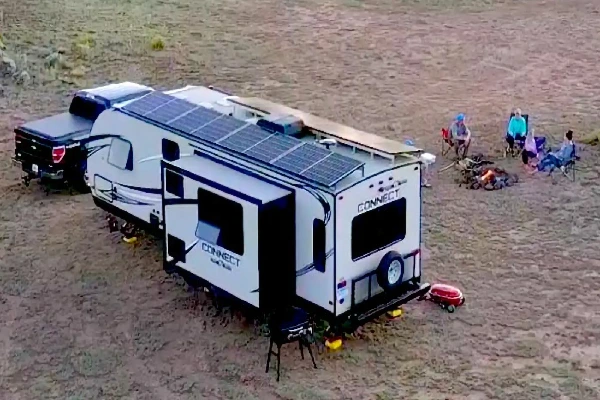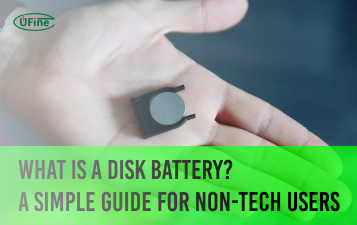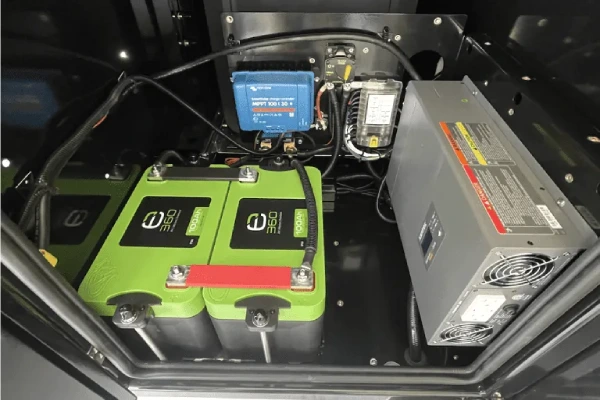Have you ever been stuck with a dead battery in nowhere? Or maybe you’ve struggled with heavy, cumbersome batteries that need constant upkeep? If so, it’s time to consider switching to lithium batteries. In this article, We’ll cover everything from the different types of RV batteries to how to maintain your new lithium battery. Let’s dive in and make your RV adventures more fun and worry-free!

Part 1. What are the types of RV battery?
To start, let’s break down the types of batteries you might come across in an RV:
- Lead-Acid Batteries: These are the most common and have been around for ages. They’re relatively cheap but heavy and require regular maintenance, like checking water levels and cleaning terminals. While they’re reliable, their lifespan is shorter compared to other types.
- AGM (Absorbent Glass Mat) Batteries: A type of lead-acid battery that’s sealed and maintenance-free. They’re more efficient and safer than regular lead-acid batteries, but they are more expensive.
- Gel Batteries: These use a gel instead of a liquid electrolyte. They’re also sealed and maintenance-free, making them safer to use. However, they can be sensitive to charging conditions and are usually more expensive.
- Lithium Batteries: The star of modern RV adventures. These batteries are lightweight, have a long lifespan, charge quickly, and require minimal maintenance. Although they are more expensive up front, their benefits often outweigh the cost.
Part 2. Why are lithium battery the best choice for RVs?
Lithium batteries are increasingly becoming the go-to choice for RV owners.
Here’s why:
- Longer Lifespan: Lithium batteries can last up to 10 years or more, compared to 3-5 years for lead-acid batteries. This means fewer replacements and less hassle over the long run.
- Lightweight: A typical lithium battery weighs significantly less than a lead-acid battery. This weight reduction can improve your RV’s fuel efficiency and make battery handling easier.
- Fast Charging: Lithium batteries can be recharged much quicker than traditional batteries. This means less downtime and more time to enjoy your adventures.
- Low Maintenance: Lithium batteries don’t need regular water top-ups or terminal cleaning, unlike lead-acid batteries. They’re pretty much set-and-forget.
- Consistent Power: Lithium batteries provide a stable voltage throughout their discharge cycle. You won’t experience the power drop-off that is common with lead-acid batteries.
- Eco-Friendly: They have a smaller environmental impact due to their longer lifespan and more efficient energy use.
Part 3. Lithium battery for RV key parameters
When choosing a lithium battery for your RV, it’s important to understand some key parameters:
- Capacity (Ah): Measured in amp-hours, this indicates how much energy the battery can store. Higher capacity means more power for your RV appliances.
- Voltage (V): Most RV systems use 12V batteries, but some setups may require 24V or even 48V systems. Make sure the battery you choose matches your RV’s requirements.
- Cycle Life: This refers to the number of complete charge/discharge cycles a battery can handle before its capacity drops significantly. Look for batteries with at least 2000 cycles for long-term use.
- Weight: A lighter battery is easier to handle and won’t add unnecessary weight to your RV, improving fuel efficiency.
- Temperature Range: Check the battery’s operating temperature range to ensure it can handle the climates you travel. Some batteries have built-in heating elements for cold weather use.
- BMS (Battery Management System): A good lithium battery should have a BMS to monitor and protect against overcharging, overheating, and deep discharging.
Part 4. How long does an RV lithium battery last?
One of the biggest advantages of lithium batteries is their longevity. On average, a lithium battery can last between 10 to 15 years or 2000 to 5000 charge cycles, depending on how you use and maintain it. This is a significant improvement over lead-acid batteries, which typically last only 3 to 5 years. This extended lifespan means fewer replacements and, ultimately, lower costs over time.
Part 5. Lithium battery for RV safe charging
Safety is a common concern when it comes to lithium batteries.
Here are some tips to ensure safe charging:
- Use the Right Charger: Always use a charger specifically designed for lithium batteries. Using an incorrect charger can lead to improper charging and potential damage.
- Avoid Overcharging: Most lithium batteries come with built-in protection against overcharging, bumonitoring the charging process is’s still a good idss. Overcharging can lead to overheating and reduce the battery’s lifespan.
- Monitor Temperatures: Charge your battery in a safe temperature range, typically between 32°F and 113°F (0°C and 45°C). Extreme temperatures can affect the battery’s performance and safety.
- Check Connections: Ensure all connections are secure, clean, and corrosion-free. Loose connections can cause sparks or short circuits.
- Storage Charging: If you’re storing your RV for an extended period, charge the battery to about 50% and disconnect it. This helps maintain the battery’s health over long periods of inactivity.
Part 6. How to know if a lithium battery is suitable for my RV?
Selecting the right lithium battery for your RV involves a few considerations:
- Compatibility: Verify that the battery’s voltage matches your RV’s electrical system. Most RVs use a 12V system, but some may require 24V or 48V setups.
- Physical Size: Ensure the battery will fit in your RV’s designated battery compartment. Measure the available space and compare it with the battery dimensions.
- Power Needs: Calculate your RV’s power consumption to determine the required battery capacity. Consider all appliances and devices you plan to use.
- Budget: While lithium batteries are more expensive initially, their long lifespan and low maintenance costs can make them more economical in the long run.
Part 7. How to choose a lithium battery for an RV?
When purchasing a lithium battery for your RV, consider these tips:
- Research Brands: Look for reputable brands known for quality and reliability. Check customer reviews and ratings to gauge satisfaction and performance.
- Compare Specifications: Examine the battery’s capacity (Ah), cycle life, weight, and other key parameters. Ensure it meets your power needs and fits your RV setup.
- Warranty: A good warranty indicates confidence in the product. Look for batteries with a substantial warranty period, which can save you money and trouble if issues arise.
- Customer Support: Choose a brand with reliable customer service. Good support can be crucial if you encounter any issues or have questions about your battery.
Part 8. Lithium battery for RV maintenance tips
Proper maintenance can extend the life of your lithium battery and ensure it performs optimally:
- Regular Inspections: Periodically check the battery for any signs of damage or swelling. Address any issues immediately to prevent further damage.
- Clean Connections: Keep the battery terminals and connections clean and free of corrosion. Use a mixture of baking soda and water to clean any corrosion you find.
- Proper Storage: If you’re not using your RV for a while, store the battery in a cool, dry place. Avoid extreme temperatures and ensure the battery is charged to about 50%.
- Avoid Full Discharge: Try not to let the battery drain completely. Partial discharges followed by recharges are better for lithium batteries.
- Monitor Performance: Keep an eye on the battery’s performance and charging times. If you notice significant changes, it might be time to check the battery or consult the manufacturer.
Part 9. Common faults and solutions of RV lithium battery
Even the best batteries can encounter issues.
Here are some common problems and their solutions:
- Battery Won’t Charge: This could be due to a faulty charger or loose connections. Ensure the charger is compatible and check all connections. If the problem persists, contact the manufacturer.
- Battery Drains Quickly: This might indicate a faulty cell or excessive power draw. Check for any devices that might be consuming more power than expected. If the issue remains, consult the manufacturer.
- Swelling Battery: Stop using the battery immediately. Swelling can be a sign of internal damage or overheating. Contact the manufacturer for advice on what to do next.
- Unusual Sounds or Smells: If you hear hissing or notice a strange smell, turn off the battery and disconnect it. These could be signs of a serious issue like a short circuit or internal damage. Seek professional help immediately.
- Inconsistent Power Output: If the battery’s power output fluctuates, it could be due to a problem with the battery management system (BMS). Check the BMS settings and consult the manufacturer if needed.
Part 10. Conclusion
Switching to lithium batteries can completely transform your RV experience. Featuring long life, lightweight design, fast charging, and minimal maintenance, lithium batteries offer numerous advantages over traditional battery types. You can better understand lithium batteries for RV by understanding the key parameters.
Related Tags:
More Articles

What Is a Disk Battery? A Simple Guide for Non-Tech Users
A disk battery is a small, round cell used in watches, remotes, and other electronic devices. It delivers steady power for compact, low-drain devices.
What Battery Powers a Space Heater?
Discover the type of battery that powers space heaters and learn how to choose the right one for efficient heating in your home or office.
What Is an LR14 Battery? Learn About This C-Size Cell
The LR14 battery, also known as a C battery, delivers steady power. Learn its specs, uses, lifespan, and how it compares to other battery types.
Watch Battery Dimensions Chart: Sizes, Voltages, and Equivalents Explained
Understanding watch battery dimensions helps you choose the right size, voltage, and equivalent model to keep your watch running safely and smoothly.
How Long Can You Rely on Battery-Powered Generators?
Discover battery generator runtime & lifespan factors. Learn how to maximize performance and choose the right power solution.




